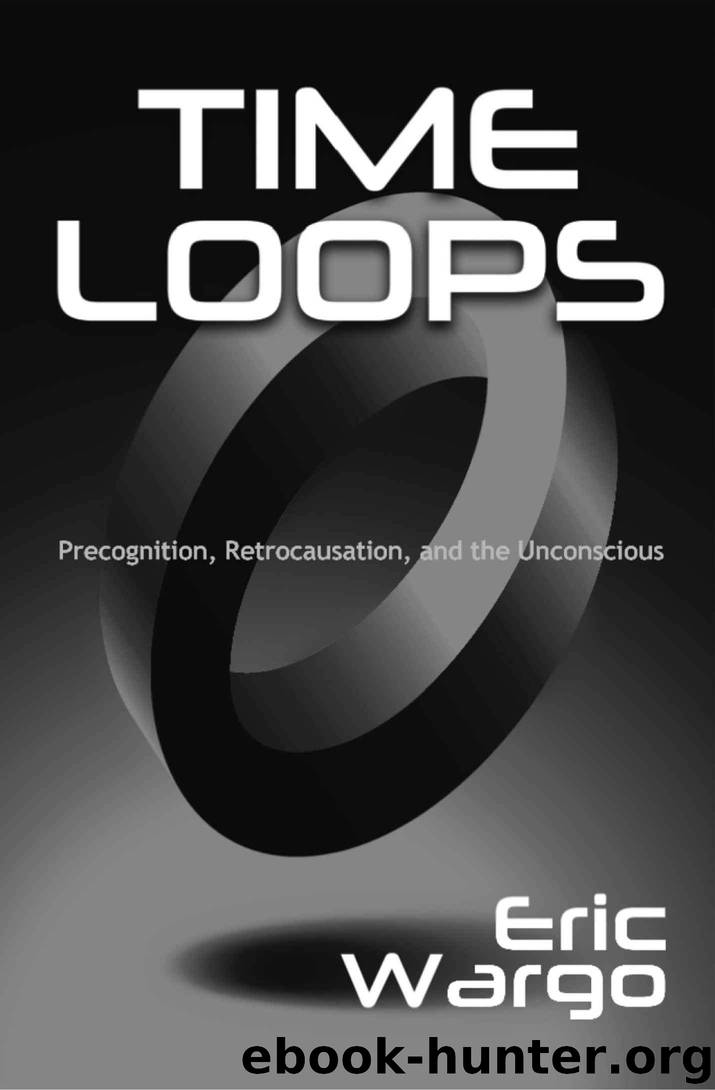Time Loops by Eric Wargo

Author:Eric Wargo [Wargo, Eric]
Language: eng
Format: epub
ISBN: 9781938398933
Publisher: Anomalist Books
Published: 2018-09-03T04:00:00+00:00
More recent investigators of precognitive dreaming have also typically not gone beyond the level of manifest content (as Freud termed the dream’s surface-level narrative and images), focusing instead on immediately obvious relations of dream elements to things seen or encountered later in waking life. In their experiments with precognitive dreaming, Stanley Krippner, Montague Ullman, and Charles Honorton had independent judges assess the similarity of their psychic subject’s dream descriptions to target scenarios (based on randomly selected paintings) without delving into the dreamer’s private and personal associations or attending to possible symbols or Freudian tropes. 27 Dale E. Graff, who directed the U.S. military’s Star Gate remote viewing program, went on to write two very interesting memoirs about his experiences as well as his personal experiments in precognitive dreaming; in his experiments, he routinely obtained many close matches between dream scenes and newspaper photographs or cartoons—although, since he focuses mainly on visual forms (per standard remote-viewing methods), he has not ventured too deeply into dream symbolism. 28 In an effort to scientifically analyze a huge database of 11,850 of his own dream scenes, many of which he identified as precognitive, film and video game CG artist Andrew Paquette claimed to find a relative in frequency of unambiguous symbols in his dreams, especially those that had veridical precognitive content. 29 On the other hand, a recent writer named Bruce Siegel, replicating Dunne’s experiment in his own life and finding that just over a quarter of his 241-dream sample appeared to be precognitive, noted that his dreams very often used the same tropes—metaphor, substitution, wordplay, etc.—that would be familiar to a psychoanalyst (and that can be glossed, for convenience, as symbolism). 30
Psychoanalytically informed parapsychologists have demonstrated that apparent precognitive dreams not only may be subject to the same kinds of contortions and distortions Freud described but may express the same types of divided feeling and emotional complexity. 31 In his 1982 book Paranormal Foreknowledge , Jule Eisenbud provides many examples of what could be called typical Dunne dreams, appearing to match something the patient was about to read in the newspaper or encounter the next day, along with the kind of richly layered (sometimes uncomfortably detailed) commentary that is typical of Freudian case studies. Eisenbud regarded precognitive elements in such dreams as serving the dream’s purpose: fulfilling a repressed wish. But it is easy to reframe the cases he presents in terms of the newer mnemonic hypothesis. What seems like a dream “collecting precognitive bricks” to fulfill a wish can generally be redescribed as a dream about the complex thoughts and emotions that will be triggered by a later, unsettling learning experience in the dreamer’s life. There is not too big a gap between the two theories: If precognition focuses on a person’s future conscious thoughts in response to some experience, those future thoughts may still often be “wishful.”
For example, a female patient with a distinctly “Oedipal” pattern of self-inhibition and frustrating relationships with older men had a dream involving her roommate, who had just become engaged to a man the patient herself had previously dated.
Download
This site does not store any files on its server. We only index and link to content provided by other sites. Please contact the content providers to delete copyright contents if any and email us, we'll remove relevant links or contents immediately.
| ESP | Near-Death Experiences |
| Out-of-Body Experiences |
Animal Frequency by Melissa Alvarez(4455)
Sigil Witchery by Laura Tempest Zakroff(4229)
Real Magic by Dean Radin PhD(4118)
Fingerprints of the Gods by Graham Hancock(3982)
Aleister Crowley: The Biography by Tobias Churton(3626)
Journeys Out of the Body by Robert Monroe(3607)
Alchemy and Alchemists by C. J. S. Thompson(3506)
The Rosicrucians by Christopher McIntosh(3505)
Mysteries by Colin Wilson(3441)
Hitler's Monsters by Eric Kurlander(3324)
The Hatha Yoga Pradipika (Translated) by Svatmarama(3311)
Wicca: a guide for the solitary practitioner by Scott Cunningham(3162)
John Dee and the Empire of Angels by Jason Louv(3157)
Infinite Energy Technologies by Finley Eversole(2968)
Book of Life by Deborah Harkness(2919)
Dark Star Rising by Gary Lachman(2858)
The Book of Lies by Aleister Crowley(2828)
Aliens by Jim Al-Khalili(2819)
To Light a Sacred Flame by Silver RavenWolf(2805)
